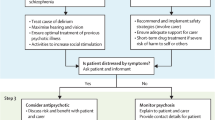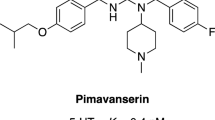Abstract
Antiepileptic drugs (AEDs) are a class of medications that have received considerable attention as possible treatments for agitation and aggression in patients with dementia. This attention has been driven in equal measure by promising findings from limited trial and observational data and the desire to find treatments with improved tolerability. Their use, to date, has been largely confined to circumstances where first-line treatments have proven inadequate or are poorly tolerated. In recent years there has been some growth in the evidence base, and we can now make more informed recommendations regarding a number of older AEDs. Carbamazepine continues to have the best evidence to support its use, although the evidence base remains relatively small and concerns regarding tolerability limit its use. There is now more consistent evidence that valproate preparations should not be used for agitation and aggression in dementia. Despite a lack of high-quality data, some results have been reported for several newer medications, including levetiracetam, oxcarbazepine, gabapentin, topiramate and lamotrigine, and a number of these warrant further investigation. Recent findings and implications for clinical practice are discussed.
Similar content being viewed by others
References
Ballard C, Corbett A, Chitramohan R, Aarsland D. Management of agitation and aggression associated with Alzheimer’s disease: controversies and possible solutions. Curr Opin Psychiatry. 2009;22(6):532–40. doi:10.1097/YCO.0b013e32833111f9.
Lyketsos CG, Lopez O, Jones B, Fitzpatrick AL, Breitner J, DeKosky S. Prevalence of neuropsychiatric symptoms in dementia and mild cognitive impairment: results from the cardiovascular health study. JAMA. 2002;288(12):1475–83.
Steinberg M, Shao H, Zandi P, Lyketsos CG, Welsh-Bohmer KA, Norton MC, et al. Point and 5-year period prevalence of neuropsychiatric symptoms in dementia: the Cache County Study. Int J Geriatr Psychiatry. 2008;23(2):170–7. doi:10.1002/gps.1858.
Howard RJ, Juszczak E, Ballard CG, Bentham P, Brown RG, Bullock R, et al. Donepezil for the treatment of agitation in Alzheimer’s disease. N Engl J Med. 2007;357(14):1382–92. doi:10.1056/NEJMoa066583.
Herrmann N, Lanctot KL, Hogan DB. Pharmacological recommendations for the symptomatic treatment of dementia: the Canadian consensus conference on the diagnosis and treatment of dementia 2012. Alzheimer’s Res Ther. 2013;5(Suppl 1):S5. doi:10.1186/alzrt201.
Gauthier S, Loft H, Cummings J. Improvement in behavioural symptoms in patients with moderate to severe Alzheimer’s disease by memantine: a pooled data analysis. Int J Geriatr Psychiatry. 2008;23(5):537–45. doi:10.1002/gps.1949.
Herrmann N, Gauthier S, Boneva N, Lemming OM. Investigators. A randomized, double-blind, placebo-controlled trial of memantine in a behaviorally enriched sample of patients with moderate-to-severe Alzheimer’s disease. Int Psychogeriatr. 2013;25(6):919–27. doi:10.1017/S1041610213000239.
Fox C, Crugel M, Maidment I, Auestad BH, Coulton S, Treloar A, et al. Efficacy of memantine for agitation in Alzheimer’s dementia: a randomised double-blind placebo controlled trial. PLoS One. 2012;7(5):e35185. doi:10.1371/journal.pone.0035185.
Seitz DP, Adunuri N, Gill SS, Gruneir A, Herrmann N, Rochon P. Antidepressants for agitation and psychosis in dementia. Cochrane Database Syst Rev. 2011;(2):CD008191. doi:10.1002/14651858.CD008191.pub2.
Porsteinsson AP, Drye LT, Pollock BG, Devanand DP, Frangakis C, Ismail Z, et al. Effect of citalopram on agitation in Alzheimer disease: the CitAD randomized clinical trial. JAMA. 2014;311(7):682–91. doi:10.1001/jama.2014.93.
Tampi RR, Tampi DJ. Efficacy and tolerability of benzodiazepines for the treatment of behavioral and psychological symptoms of dementia: a systematic review of randomized controlled trials. Am J Alzheimers Dis Other Demen. 2014. doi:10.1177/1533317514524813.
Tekin S, Mega MS, Masterman DM, Chow T, Garakian J, Vinters HV, et al. Orbitofrontal and anterior cingulate cortex neurofibrillary tangle burden is associated with agitation in Alzheimer disease. Ann Neurol. 2001;49(3):355–61.
Sultzer D, Melrose R, Leskin L, Narvaez T, Ando T, Walston A, et al. FDG-PET cortical metabolic activity associated with distinct “agitation” behaviors in Alzheimer’s disease. Poster presented at the Alzheimer’s Association International Conference on Alzheimer’s Disease (ICAD); Paris, France; 2011.
Sweet RA, Pollock BG, Sukonick DL, Mulsant BH, Rosen J, Klunk WE, et al. The 5-HTTPR polymorphism confers liability to a combined phenotype of psychotic and aggressive behavior in Alzheimer disease. Int Psychogeriatr. 2001;13(4):401–9.
Zahodne LB, Ornstein K, Cosentino S, Devanand DP, Stern Y. Longitudinal relationships between Alzheimer disease progression and psychosis, depressed mood, and agitation/aggression. Am J Geriatr Psychiatry. 2013. doi:10.1016/j.jagp.2013.03.014.
Rabins PV, Schwartz S, Black BS, Corcoran C, Fauth E, Mielke M, et al. Predictors of progression to severe Alzheimer’s disease in an incidence sample. Alzheimers Dement. 2013;9(2):204–7. doi:10.1016/j.jalz.2012.01.003.
Rabinowitz J, Davidson M, De Deyn PP, Katz I, Brodaty H, Cohen-Mansfield J. Factor analysis of the Cohen-Mansfield Agitation Inventory in three large samples of nursing home patients with dementia and behavioral disturbance. Am J Geriatr Psychiatry. 2005;13(11):991–8. doi:10.1176/appi.ajgp.13.11.991.
Hollingworth P, Hamshere ML, Moskvina V, Dowzell K, Moore PJ, Foy C, et al. Four components describe behavioral symptoms in 1,120 individuals with late-onset Alzheimer’s disease. J Am Geriatr Soc. 2006;54(9):1348–54. doi:10.1111/j.1532-5415.2006.00854.x.
Geda YE, Schneider LS, Gitlin LN, Miller DS, Smith GS, Bell J, et al. Neuropsychiatric symptoms in Alzheimer’s disease: past progress and anticipation of the future. Alzheimers Dement. 2013;9(5):602–8. doi:10.1016/j.jalz.2012.12.001.
Cohen-Mansfield J. Assessment of agitation. Int Psychogeriatr. 1996;8(2):233–45.
Post RM, Susan R, Weiss B. Sensitization, kindling, and carbamazepine: an update on their implications for the course of affective illness. Pharmacopsychiatry. 1992;25(1):41–3. doi:10.1055/s-2007-1014386.
Chambers CA, Bain J, Rossbottom R, Ballinger BR, McLaren S. Carbamazepine in senile dementia and overactivity: a placebo controlled double blind trial IRCS. Med Sci. 1982;10:505–6.
Tariot PN, Erb R, Leibovici A, Podgorski CA, Cox C, Asnis J, et al. Carbamazepine treatment of agitation in nursing home patients with dementia: a preliminary study. J Am Geriatr Soc. 1994;42(11):1160–6.
Tariot PN, Erb R, Podgorski CA, Cox C, Patel S, Jakimovich L, et al. Efficacy and tolerability of carbamazepine for agitation and aggression in dementia. Am J Psychiatry. 1998;155(1):54–61.
Cooney C, Mortimer A, Smith A, Newton K, Wrigley M. Carbamazepine use in aggressive behaviour associated with senile dementia. Int J Geriatr Psychiatry. 1996;11:901–5.
Olin JT, Fox LS, Pawluczyk S, Taggart NA, Schneider LS. A pilot randomized trial of carbamazepine for behavioral symptoms in treatment-resistant outpatients with Alzheimer disease. Am J Geriatr Psychiatry. 2001;9(4):400–5.
Dong X, Leppik IE, White J, Rarick J. Hyponatremia from oxcarbazepine and carbamazepine. Neurology. 2005;65(12):1976–8. doi:10.1212/01.wnl.0000188819.45330.90.
Rosenberg G. The mechanisms of action of valproate in neuropsychiatric disorders: can we see the forest for the trees? Cellular and molecular life sciences: CMLS. 2007;64(16):2090–103. doi:10.1007/s00018-007-7079-x.
Weiss SR, Post RM. Kindling: separate vs. shared mechanisms in affective disorders and epilepsy. Neuropsychobiology. 1998;38(3):167–80.
Porsteinsson AP, Tariot PN, Erb R, Cox C, Smith E, Jakimovich L, et al. Placebo-controlled study of divalproex sodium for agitation in dementia. Am J Geriatr Psychiatry. 2001;9(1):58–66.
Tariot PN, Schneider LS, Mintzer JE, Cutler AJ, Cunningham MR, Thomas MS, et al. Safety and tolerability of divalproex sodium in the treatment of signs and symptoms of mania in elderly patients with dementia: results of a double-blind, placebo-controlled trial. Curr Ther Res. 2001;62(1):51–67.
Lonergan ET, Cameron M, Luxenberg J. Valproic acid for agitation in dementia. Cochrane Database Syst Rev. 2004;(2):CD003945. doi:10.1002/14651858.CD003945.pub2.
Tariot PN, Raman R, Jakimovich L, Schneider L, Porsteinsson A, Thomas R, et al. Divalproex sodium in nursing home residents with possible or probable Alzheimer disease complicated by agitation: a randomized, controlled trial. Am J Geriatr Psychiatry. 2005;13(11):942–9. doi:10.1176/appi.ajgp.13.11.942.
Herrmann N, Lanctot KL, Rothenburg LS, Eryavec G. A placebo-controlled trial of valproate for agitation and aggression in Alzheimer’s disease. Dement Geriatr Cogn Disord. 2007;23(2):116–9. doi:10.1159/000097757.
Lonergan E, Luxenberg J. Valproate preparations for agitation in dementia. Cochrane Database Syst Rev. 2009;(3):CD003945. doi:10.1002/14651858.CD003945.pub3.
Tariot PN, Schneider LS, Cummings J, Thomas RG, Raman R, Jakimovich LJ, et al. Chronic divalproex sodium to attenuate agitation and clinical progression of Alzheimer disease. Arch Gen Psychiatry. 2011;68(8):853–61. doi:10.1001/archgenpsychiatry.2011.72.
Fleisher AS, Truran D, Mai JT, Langbaum JB, Aisen PS, Cummings JL, et al. Chronic divalproex sodium use and brain atrophy in Alzheimer disease. Neurology. 2011;77(13):1263–71. doi:10.1212/WNL.0b013e318230a16c.
Trannel TJ, Ahmed I, Goebert D. Occurrence of thrombocytopenia in psychiatric patients taking valproate. Am J Psychiatry. 2001;158(1):128–30.
McCall M, Bourgeois JA. Valproic acid-induced hyperammonemia: a case report. J Clin Psychopharmacol. 2004;24(5):521–6.
Lanctot KL, Herrmann N, Rothenburg L, Eryavec G. Behavioral correlates of GABAergic disruption in Alzheimer’s disease. Int Psychogeriatr. 2007;19(1):151–8. doi:10.1017/S1041610206003899.
Parsons B, Tive L, Huang S. Gabapentin: a pooled analysis of adverse events from three clinical trials in patients with postherpetic neuralgia. Am J Geriatr Pharmacother. 2004;2(3):157–62. doi:10.1016/j.amjopharm.2004.09.004.
Kim Y, Wilkins KM, Tampi RR. Use of gabapentin in the treatment of behavioural and psychological symptoms of dementia: a review of the evidence. Drugs Aging. 2008;25(3):187–96.
Herrmann N, Lanctot K, Myszak M. Effectiveness of gabapentin for the treatment of behavioral disorders in dementia. J Clin Psychopharmacol. 2000;20(1):90–3.
Cooney C, Murphy S, Tessema H, Freyne A. Use of low-dose gabapentin for aggressive behavior in vascular and mixed vascular/Alzheimer dementia. J Neuropsychiatry Clin Neurosci. 2013;25(2):120–5. doi:10.1176/appi.neuropsych.12050115.
Devarajan S, Dursun SM. Aggression in dementia with lamotrigine treatment. Am J Psychiatry. 2000;157(7):1178.
Ng B, Camacho A, Bardwell W, Sewell DD. Lamotrigine for agitation in older patients with dementia. Int Psychogeriatr. 2009;21(1):207–8. doi:10.1017/S1041610208007898.
Sajatovic M, Ramsay E, Nanry K, Thompson T. Lamotrigine therapy in elderly patients with epilepsy, bipolar disorder or dementia. Int J Geriatr Psychiatry. 2007;22(10):945–50. doi:10.1002/gps.1784.
Dolder CR, Nealy KL. The efficacy and safety of newer anticonvulsants in patients with dementia. Drugs Aging. 2012;29(8):627–37. doi:10.2165/11632480-000000000-00000.
Kyomen HH, Whitfield TH, Baldessarini RJ. Levetiracetam for manic behavior in hospitalized geriatric patients with dementia of the Alzheimer’s type. J Clin Psychopharmacol. 2007;27(4):408–10. doi:10.1097/01.jcp.0000264996.08901.3c.
Weiner MF, Womack KB, Martin-Cook K, Svetlik DA, Hynan LS. Levetiracetam for agitated Alzheimer’s disease patients. Int Psychogeriatr. 2005;17(2):327–8.
Bakker A, Krauss GL, Albert MS, Speck CL, Jones LR, Stark CE, et al. Reduction of hippocampal hyperactivity improves cognition in amnestic mild cognitive impairment. Neuron. 2012;74(3):467–74. doi:10.1016/j.neuron.2012.03.023.
Sommer OH, Aga O, Cvancarova M, Olsen IC, Selbaek G, Engedal K. Effect of oxcarbazepine in the treatment of agitation and aggression in severe dementia. Dement Geriatr Cogn Disord. 2009;27(2):155–63. doi:10.1159/000199236.
Meldrum BS. Update on the mechanism of action of antiepileptic drugs. Epilepsia. 1996;37(Suppl 6):S4–11.
Sommer BR, Fenn HH, Ketter TA. Safety and efficacy of anticonvulsants in elderly patients with psychiatric disorders: oxcarbazepine, topiramate and gabapentin. Expert opinion on drug safety. 2007;6(2):133–45. doi:10.1517/14740338.6.2.133.
Fhager B, Meiri IM, Sjogren M, Edman A. Treatment of aggressive behavior in dementia with the anticonvulsant topiramate: a retrospective pilot study. Int Psychogeriatr. 2003;15(3):307–9.
Mowla A, Pani A. Comparison of topiramate and risperidone for the treatment of behavioral disturbances of patients with Alzheimer disease: a double-blind, randomized clinical trial. J Clin Psychopharmacol. 2010;30(1):40–3. doi:10.1097/JCP.0b013e3181ca0c59.
Gupta S, Masand PS, Frank BL, Lockwood KL, Keller PL. Topiramate in bipolar and schizoaffective disorders: weight loss and efficacy. Prim Care Companion J Clin Psychiatry. 2000;2(3):96–100.
Rodda J, Morgan S, Walker Z. Are cholinesterase inhibitors effective in the management of the behavioral and psychological symptoms of dementia in Alzheimer’s disease? A systematic review of randomized, placebo-controlled trials of donepezil, rivastigmine and galantamine. Int Psychogeriatr. 2009;21(5):813–24. doi:10.1017/S1041610209990354.
Acknowledgments
No industry funding was received to assist with the preparation of this review. Dr. Gallagher has no conflicts of interest to declare. Dr. Herrmann has received research Grants from Lundbeck, Sanofi-Aventis and Roche, consultant fees from Abbvie and speaker’s honoraria from Pfizer.
Author information
Authors and Affiliations
Corresponding author
Rights and permissions
About this article
Cite this article
Gallagher, D., Herrmann, N. Antiepileptic Drugs for the Treatment of Agitation and Aggression in Dementia: Do They Have a Place in Therapy?. Drugs 74, 1747–1755 (2014). https://doi.org/10.1007/s40265-014-0293-6
Published:
Issue Date:
DOI: https://doi.org/10.1007/s40265-014-0293-6




